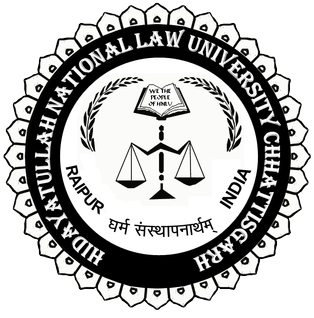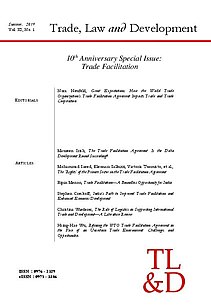
The World Trade Organization (WTO) is an intergovernmental organization headquartered in Geneva, Switzerland that regulates and facilitates international trade. Governments use the organization to establish, revise, and enforce the rules that govern international trade in cooperation with the United Nations System. The WTO is the world's largest international economic organization, with 166 members representing over 98% of global trade and global GDP.
The Doha Development Round or Doha Development Agenda (DDA) is the trade-negotiation round of the World Trade Organization (WTO) which commenced in November 2001 under then director-general Mike Moore. Its objective was to lower trade barriers around the world, and thus increase global trade.

The Indian Institute of Foreign Trade (IIFT) is a public business school headquartered in New Delhi, Delhi, India. It has been proposed to be declared as an Institute of National Importance by the Government of India. Established in 1963, it functions under the Ministry of Commerce and Industry of the Government of India. It also serves as a training institute for the probationary officers of the Indian Trade Service. Its headquarters are in New Delhi and it has additional campuses in GIFT City, Kolkata and Kakinada.

National Law University, Jodhpur (NLUJ) is a public law school and a National Law University established under the National Law University, Jodhpur, Act, 1999 enacted by the Rajasthan State Legislature. The university was established for the advancement of learning, teaching, research and diffusion of knowledge in the field of law. It is one of the autonomous law schools in India.
The Boston College Law Review is an academic journal of legal scholarship and a student organization at Boston College Law School. It was established in 1959. Until 1977, it was known as the Boston College Industrial & Commercial Law Review. Among student-edited general-interest law reviews, it is currently ranked 21st in the Washington and Lee School of Law Law Journal Rankings.

Hidayatullah National Law University (HNLU) is a public law school and a National Law University located in New Raipur, Chhattisgarh, India. It was named after the former Chief Justice of India, Mohammad Hidayatullah. It is one of the autonomous law schools in India and seventh in the series of such national law schools. It was established as a centre for legal excellence by the Government of Chhattisgarh under the Hidayatullah National University of Law, Chhattisgarh Act. The university offers a B.A. LL.B. (Hons.) integrated Program, an L.L.M. Program, and a PhD Course.

Steve Charnovitz is an American legal scholar. He teaches at the George Washington University Law School in Washington, D.C., and is best known for his writings on the linkages between trade and environment and trade and labor rights. He is also known for his scholarship on the historical role of nongovernmental organizations in international governance.
The Global Environment & Trade Study (GETS) was a non-profit research institute established in 1994 to study the complex linkages between international trade and environmental sustainability. GETS supported numerous research projects on the legal, economic, and ecological aspects of trade and environment.

The Common Law Admission Test (CLAT) is a centralized national-level entrance test for admissions to the 25 out of 27 National Law Universities (NLU) except NLU Delhi and NLU Meghalaya. CLAT was first introduced in 2008 as a centralized entrance examination for admission to the National Law Schools/Universities in India.
A law review or law journal is a scholarly journal or publication that focuses on legal issues. A law review is a type of legal periodical. Law reviews are a source of research, imbedded with analyzed and referenced legal topics; they also provide a scholarly analysis of emerging legal concepts from various topics. The primary function of a law review is to publish scholarship in the field of law. Law reviews publish lengthy, comprehensive treatments of subjects, that are generally written by law professors, and to a lesser extent judges, or legal practitioners. The shorter pieces, attached to the articles, commonly called "notes" and "comments", often are written by law student members of the law review. Law review articles often express the thinking of specialists or experts with regard to problems, in a legal setting, with potential solutions to those problems. Historically, law review articles have been influential in the development of the law; they have been frequently cited as persuasive authority by courts. Some law schools publish specialized reviews, dealing with a particular area of the law, such as civil rights and civil liberties, international law, environmental law, and human rights. Some specialized reviews focus on statutory, regulatory, and public policy issues.
John Sullivan Wilson is a former Lead Economist (retired) of the World Bank. He directed and managed research on transparency, trade facilitation, regulation, and economic development. Mr. Wilson served in the Development Research Group of the World Bank and also in operations in the Infrastructure Vice Presidency.

The Agreement on Trade-Related Aspects of Intellectual Property Rights (TRIPS) is an international legal agreement between all the member nations of the World Trade Organization (WTO). It establishes minimum standards for the regulation by national governments of different forms of intellectual property (IP) as applied to nationals of other WTO member nations. TRIPS was negotiated at the end of the Uruguay Round of the General Agreement on Tariffs and Trade (GATT) between 1989 and 1990 and is administered by the WTO.
The Penn State Law Review is a law review and the flagship legal publication of Penn State Law. Its origins trace back to 1897 as The Forum, later renamed the Dickinson Law Review while affiliated with the Dickinson Law School, making it one of the oldest legal periodicals in the United States. When the Dickinson Law School merged with Penn State University in 2003, the name of the periodical was changed to the Penn State Law Review. Following the separation of the Penn State Law and Penn State Dickinson Law campuses into separately-accredited law schools in 2016, each school maintained separate law reviews; the name Dickinson Law Review was readopted by its respective law school, while the name Penn State Law Review was retained by Penn State Law.

Amir Ullah Khan is a professional economist and professor who works on development issues primarily in the health, education, and agriculture sectors. Prof. Khan has worked for the Ministry of Finance, Government of India and the UNDP at Project LARGE. He is a former Deputy Director and policy advisor to the Bill and Melinda Gates Foundation. Prof. Khan writes a regular column for the business news publication livemint.com and for the newspaper etemaaddaily.com He is also a visiting professor at the Indian School of Business and at NALSAR in Hyderabad.
Kym Anderson is an Australian economist, specialising in trade policy and issues related to the World Trade Organization. He studied at the University of New England, the University of Adelaide and the University of Chicago before completing a PhD at Stanford University. He holds a Personal Chair in the School of Economics and is Foundation Executive Director of the Centre for International Economic Studies at the University of Adelaide
James Harrison is a British academic who researches analysing the human rights and environmental impacts of economic laws and regulations. As of 2013, he was employed as associate professor and co-director of the Centre for Human Rights in Practice, School of Law, University of Warwick.
The Indian Trade Service (ITdS) is a civil service under Group A of the Central Civil Services of the executive branch of the Government of India. It was created as a specialized cadre to handle India's international trade and commerce on the basis of the recommendations of the Mathur Committee in 1965. At present, the Directorate General of Foreign Trade (DGFT), under the Ministry of Commerce and Industry, is the cadre controlling authority of the ITS. DGFT has 38 regional offices across India, and plays a significant role in promoting India's international trade with its policy formulation and implementation.

Rakesh "Raj" Kumar Bhala is an Indian-American author, lawyer and professor, prominent in the fields of International trade law, Islamic Law (Sharia), and law and literature. He is a professor at the University of Kansas School of Law where he is the inaugural Leo S. Brenneisen Distinguished Professor of Law. Previously he had served as the university's Associate Dean for International and Comparative Law (2011–2017). He is the author of leading textbooks in international trade law, among others, and of a periodic column on international law, titled "On Point," that was published by BloombergQuint (India) from January 2017 through October 2022. In June 2020, Ingram's Magazine named him as one of "50 Kansans You Should Know." He is a member of the U.S. State Department Speaker Program.
Vijender Kumar is a professor of Law and currently serving as the Vice-Chancellor of Maharashtra National Law University, Nagpur, a National Law University in Nagpur, Maharashtra, India. With his experience as a legal professional at Bar Council of India, and also as an Academic administrator in Indian legal realm, Kumar is regarded as one of the authorities on the subject of Family law in India.
Julien Chaisse is a professor of law at the City University of Hong Kong, specializing in international law, with a particular focus on globalization, foreign investment and digital asset.











